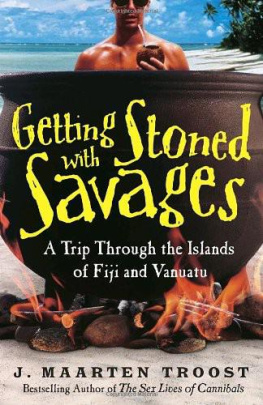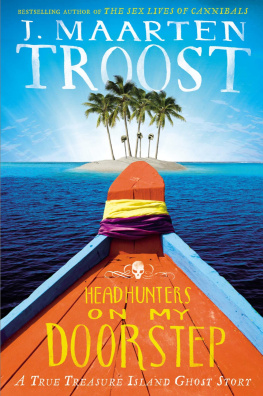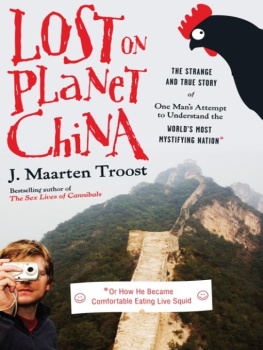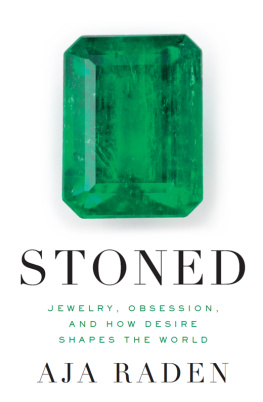 CONTENTS
CONTENTS
Cover Page
Title Page
Dedication
Disclaimer
Chapter 1
IN WHICH the author, much to his surprise, finds himself holding down a job, a real job that could possibly lead to a career, which causes him considerable distress as he envisions his world reduced to swirling acronyms, whereupon his beguiling wife offers him another way, an escape, an alternate road, and together they decide to move to the distant islands of the South Pacific.
Chapter 2
IN WHICH the author offers some interesting arcana about Vanuatuits one-hundred-some languages, its history of cannibalism, its cargo cults, its smoldering volcanoesand arrives on the island of Efate, where he soon gets stuck.
Chapter 3
IN WHICH the author is confounded by Port Vila, which is not at all like the South Pacific he has knownhe does not, for instance, have to eat fish every dayand after dipping into the past, which strikes him as being uncannily like the present, he cannot help but feel that for the whites in Vila its forever 1900.
Chapter 4
IN WHICH the author is introduced to kava, which he likes very much, oh yes, very much indeed.
Chapter 5
IN WHICH the author is reduced to a state of wondrous awe as the prime minister of Vanuatu conspires to sell his country in exchange for a ruby, a giant ruby, which curiously no one is allowed to examine.
Chapter 6
IN WHICH the author ponders cannibalism and discovers that he just doesnt get itnot at all, cannot get past the icky factorand so, left to his own devices by his beguiling wife, he decides to seek enlightenment on the island of Malekula, where until recently, within his own lifetime even, they lunched on people.
Chapter 7
IN WHICH the author experiences his first cyclone, causing him to reconsider his position on Naturewhether hes for it or against itand after a terrifying encounter with a giant centipede seems to have settled the issue, his wife gives him News, which only complicates the matter further.
Chapter 8
IN WHICH the author travels to the island of Tanna, where he ascends an active volcano; witnesses the extraordinary Nekowiar ceremony, culminating with the slaughter of two hundred pigs; and meets with villagers deep within the forest who live according to the tenets of kastom, which is another word for naked.
Chapter 9
IN WHICH the author arrives in Fiji and soon finds himself cavorting with prostitutes, which he acknowledges he shouldnt be doing, especially as his wife is in a family way, but seediness, as usual, has a way of finding him.
Chapter 10
IN WHICH the author embraces Fijian history and culture, particularly the Fijian national rugby team, and discovers rugby to be very exciting, uplifting even, as he finds that when the national team plays, for an hour or two at least, Fiji is harmonious.
Chapter 11
IN WHICH the author discovers, shortly after rising from his slumbers, that his backyard has disappeared and that it can be found residing by the shanty down the hill, leaving in its place a cavernous chasm upon which his house is delicately perched, a circumstance that provides him with one more reason to take a holiday, to get away from it all, and so with his wife he travels far, far away to Fijithat is, the Other Fiji.
Chapter 12
IN WHICH a child is born, causing much bewilderment for his parents, though fortunately they are soon set straight by Anna, who shows them how to raise a child island-style.
Chapter 13
IN WHICH the author travels to Savusavu on the island of Vanua Levu, a journey that causes him to reconsider his aversion to flying, and while exploring the island he discovers that even here, in what might be called paradise, there are many yearning for escape.
Chapter 14
IN WHICH the author and his wife decide to depart the islands of the South Pacific and return to the United States, which strikes most peopleeven most Americans they knowas utterly insane, all things considered, but they do it anyway, because now, at last, for the first time ever, they find themselves yearning for home.
Authors Note
Acknowledgments
About the Author
Also by J. Maarten Troost
Copyright Page
For Sylvia, Lukas, and Samuel
DISCLAIMER
The author acknowledges that he is not Bob Woodward. Mr. Woodward is scrupulous with names and dates. This author is not. Mr. Woodward would never suggest that something happened in October when, in fact, it occurred in April. This author would. Mr. Woodward recounts conversations as they actually occurred. This author would like to do that, but alas, he does not excel at penmanship and he cannot read his notes. However, the author has an excellent memory. You can trust him.

I HAVE BEEN CALLED MANY THINGS IN MY LIFE, BUT IF there has been but one constant, one barb, one arrow flung my way time after time, it is the accusation that I am, in essence, nothing more than an escapist. Apparently this is bad, suspect, possibly even un-American. Mention to someone that, all things being equal, youd really rather be on an island in the South Pacific, and theyll look at you quizzically, ponder the madness of the notion for a moment, and say: But thats just escapism. Now would you kindly finish stocking the paper clips so we have time to rearrange the Hi-Liter markers? We need to make sure theyre color-coordinated.
Im not sure where this tendency came from. Escapism, we are led to believe, is evidence of a deficiency in character, a certain failure of temperament, and like so many -isms, it is to be strenuously avoided. How do you expect to get ahead? people ask. But the question altogether misses the point. The escapist doesnt want to get ahead. He simply wants to get away. I understand this, for I am an unapologetic escapist. Once before, I had abandoned the life I knew in Washington, D.C., escaping the urgent din of the continental world for a distant atoll in the equatorial Pacific. I lived there for two years, never once looking at a clock, marveling at what a strange turn my life had taken. I may have heat rash, I thought back then, and I might be hosting eight different kinds of parasites, but at least Im not some office drone. I had escaped, I thought mirthfully as I tended to my septic infections. And then, suddenly, my life took another dramatic U-turn, and I once again found myself back in Washington, where every morning I was confronted by a debilitating decision: What tie to wear?
The dissonance was overwhelming. One day, I found myself pressed inside the Washington Metro, soaked through from a November rain, palpitating slightly as I realized I had an 8 A.M. meeting and it was presently 8:17 A.M., and just like that it occurred to me that six months earlier I could be found paddling an outrigger canoe across the sun-dappled waters of a lagoon in the South Pacific. This had been happening for some time, this juxtaposition of my former life upon my present one, and the contrast never failed to leave me twitching in bafflement. How had this happened? Huddled on the subway, I lingered on the image for a moment, far away, envisioning the canopy of palm trees swaying in the near distance, the urgent leap of a flying fish, the fishermen in sailing canoes returning with their catch, the brilliant, shimmering colors offered by a setting sun, until my reverie came to an abrupt end as the subway doors opened and I was swept into the tumult of the rush-hour commute. It was a disconcerting sensation. Blue, blue water, I thought in vain as I was shepherded onto an escalator crowded with pasty-faced suits like myself, dejected already. I tried imagining swaying palm trees as I scurried through the rain toward my office at the World Bank, flashing the color-coded ID card I kept tethered to my belt. Inside, I tried conjuring stress-free tropical living once I found on my chair a dreaded note from my boss: PLEASE SEE ME. 7:45 A.M. But the image was gone. Poof.











 CONTENTS
CONTENTS